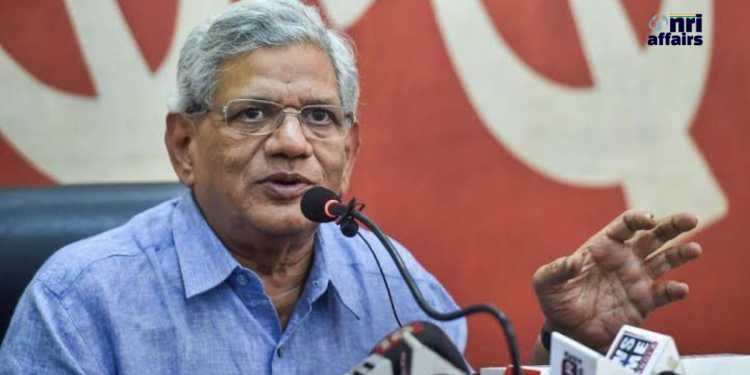From the hallowed halls of Jawaharlal Nehru University (JNU), where political debates and activism are part of the daily fabric, Sitaram Yechury rose as a brilliant student leader, leaving an indelible mark on Indian politics. His passing has been met with an outpouring of grief from friends, colleagues, and the wider political community, who remember him not just for his intellectual brilliance, but for his lifelong commitment to secular democracy and social justice.
Early Life and Education: A Born Leader
Born in Andhra Pradesh, Yechury’s early education in Hyderabad was disrupted by the Telangana movement. His pursuit of knowledge brought him to Delhi in 1969, where he enrolled in St. Stephen’s College and completed his undergraduate degree in Economics. However, it was at Jawaharlal Nehru University (JNU) where Yechury found his true calling, both as a student of economics and as a firebrand political activist.
In 1974, Yechury joined the Students’ Federation of India (SFI), marking the beginning of his lifelong association with leftist politics. It was not long before he became a member of the Communist Party of India (Marxist), or CPI(M). His leadership skills came to the forefront during the Emergency period, a time of political turbulence in India.
The Emergency and Student Activism at JNU
The Emergency of 1975-1977, declared by then Prime Minister Indira Gandhi, was a defining period for Yechury’s political career. Alongside other student leaders, Yechury played a pivotal role in resisting authoritarianism. One iconic image from this period captures Yechury standing with a firm resolve beside Indira Gandhi, reading a list of grievances on behalf of JNU students. This moment came after Yechury led a march to her residence, demanding her resignation as JNU’s chancellor following her electoral defeat in 1977.
Former batchmate and poet Manmohan recalls, “Yechury read out the memorandum passionately, and Indira Gandhi, visibly displeased, responded that this was not the way to present a memorandum.” This bold stand cemented Yechury’s reputation as a leader who was unafraid to speak truth to power, a quality that defined his career in politics.
A Scholar and an Activist
Though deeply entrenched in political activism, Yechury was also a dedicated student. His batchmate and close friend Anuradha Chenoy, a retired professor of International Studies at JNU, remembers him fondly as a brilliant mind: “The highest grade one could get at JNU was an A plus, but teachers would grade Sita an A plus infinitum. If Sita wanted, he could’ve been the head of the World Bank today.”
Yechury’s intellectual prowess, combined with his passion for social justice, made him a key figure not just in student politics but in the broader intellectual culture at JNU. His meticulous nature as a record-keeper of university events proved invaluable in negotiations with authorities, according to his friend and former JNUSU president, D Raghunandan.
Leadership in JNU and Beyond
Sitaram Yechury’s leadership within JNU’s student body was nothing short of remarkable. Elected as the president of the Jawaharlal Nehru University Students’ Union (JNUSU) three times between 1977 and 1978, his tenure was unprecedented and is remembered as a testament to his leadership abilities.
His influence extended beyond the university, with his political activism making ripples on the national stage. During the Supreme Court’s ban on JNUSU elections in 2008, Yechury was one of the first to stand in solidarity with the students, fighting to restore democratic elections within the university.
A Lifelong Advocate for Democracy and Secularism
Throughout his life, Yechury remained a steadfast advocate for secularism, democracy, and scientific temper. Anand Kumar, another JNU alumnus who shared a hostel with Yechury, recalls his role in shaping the intellectual and political culture of their generation: “Sita was always a champion for scientific temper.”
His leadership extended beyond his student years, as he played a critical role in defending the rights of students during the 2016 crackdown on JNU. Even after leaving active student politics, Yechury remained a staunch supporter of the student community, consistently showing up when needed.
The Personal Loss of a Political Giant
For many who knew him personally, Yechury’s death marks the loss of not just a political leader, but a dear friend and comrade. Anuradha Chenoy speaks of his passing with profound sadness: “Sita’s demise is a big personal loss for me and a political loss for the secular democracy of this country. For all his friends, colleagues, and teachers, it is like a star has gone out of our lives.”
V Lenin Kumar, a former JNUSU president and fellow student activist, recalls Yechury’s unwavering support during key moments of student unrest. “In 2016, when there was a crackdown on the students of JNU, Yechury came to the campus during the protests and showed his support. Whenever we invited him, he would always show up,” Kumar reflects.
Sitaram Yechury’s legacy is one that will endure for generations to come. His life was defined by a commitment to justice, equality, and democratic values. He navigated the tumultuous world of Indian politics with integrity, intelligence, and a deep sense of responsibility towards the marginalized.
From his days as a student leader at JNU to his rise as a key figure in national politics, Yechury’s journey is a testament to the power of education, activism, and leadership. As India continues to grapple with its democratic and secular foundations, Yechury’s life serves as a reminder of what can be achieved through principled leadership and unwavering dedication to the cause of justice.











